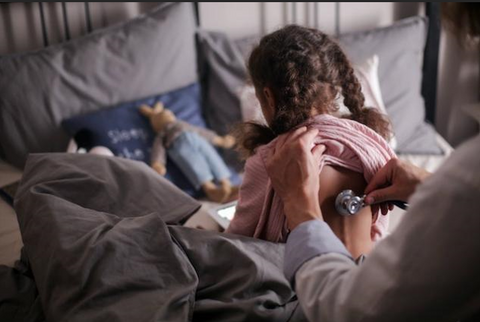A joint publication by the World Health Organization (WHO) and the United States Centers for Disease Control and Prevention (CDC) has said that measles vaccination has declined since the start of the COVID-19 pandemic.
This is a global problem as it can spread rapidly in communities and across international borders.
In this article, we look at the signs of measles, treatment and how you can prevent it.
What does the report say?
The report says that nearly 40 million children missed a measles vaccination dose last year. This is one of the factors that mean measles poses a risk worldwide.
Experts say that around 95 per cent of a community needs to be vaccinated to protect against an epidemic.
The drop in vaccination, poor monitoring and delayed response plans because of the COVID-19 epidemic mean that many children all over the world are at risk of catching the disease.
What is measles?
Measles is one of the world’s most infectious diseases.
It’s caused by a virus and can be very serious, even causing death in some cases.
Measles vaccination in Australia was first made available to children in 1971. Before this time, it was a common childhood disease.
Thanks to vaccination, it is now rare, but outbreaks can occur when infected people enter Australia from abroad.
What are the signs of measles?
Measles symptoms can be seen around 10 days after exposure to the infection.
The first signs that tend to last for two to four days are:
- Fatigue
- Fever
- Severe cough
- Conjunctivitis (red eyes)
- Runny nose
- White spots in the mouth
A rash usually appears on day three of the illness, starting at the head and spreading over the body.
It tends to be red and blotchy rather than itchy.
How is measles spread?
Measles is spread by contact with an infected person. If they cough or sneeze near you, you may become infected that way.
The virus particles can even stay in the air or on surfaces for up to two hours after an infected person has left the room or area.
It’s a very infectious disease, and people can pass it on from around five days before the rash appears to around four days after it has first been seen.
Anyone can get measles if they are not immune, for example, if they have not been vaccinated and have not had the illness before.
What are the complications of measles?
If you catch measles during pregnancy, your risk of miscarriage and pre-term labour increases.
Other complications include:
- Ear infections
- Diarrhoea
- Pneumonia
- Inflammation of the lining of the brain (meningitis) or of the brain itself (encephalitis), which can cause convulsions (fits) and lead to deafness or intellectual disability
You should seek urgent medical help if you have concerns about a patient with measles or notice that they have:
- Breathing difficulties
- High fever
- Stiff neck
- Extreme drowsiness
- Ear ache
- Diarrhoea
What’s the treatment for measles?
There is no specific treatment for measles. But the symptoms can be managed if they are mild by:
- Resting
- Drinking plenty of fluids
- Managing fever by keeping an eye on the patient’s temperature, using over-the-counter medication such as paracetamol and applying cooling products
If the patient has severe symptoms or complications, they will have to be treated in the hospital.
How can I prevent measles?
The most effective way to prevent the illness is by measles vaccination.
The measles vaccine age is 12 months for the first dose and 18 months for the second dose.
It is given in combination with vaccines for mumps and rubella (the MMR vaccine) or with mumps, rubella and varicella (the MMR-V vaccine).
If you didn’t receive a measles vaccination when you were a child, you could speak to your doctor about getting it now.
Know that the measles vaccine is not advised for pregnant women or people with a weakened immune system.
It’s also not usually given to people born before 1966. This is because they are likely to have had measles during childhood, making them immune.
You can also protect yourself and your family against all infections by:
- Washing your hands frequently with soap and water
- Using an alcohol-based hand sanitiser in between handwashing
- Wearing a face mask in crowded places
Browse our health and wellbeing products
Thankfully, measles is still rare in Australia thanks to the vaccination programme.
But because it is very contagious, it can spread quickly to unvaccinated people.
If you’re a parent, be sure to get your child vaccinated against measles and other diseases on time. You can speak to your doctor about this.
You can also browse the FeverMates collection of health and wellbeing products designed to keep you healthy and help if you have minor symptoms.
Everyday items include thermometers, cooling products, face masks and hand sanitiser, which all go a long way to aid your wellbeing.
Know that we’re by your side to help keep you and your family happy, healthy and living life to the fullest!

